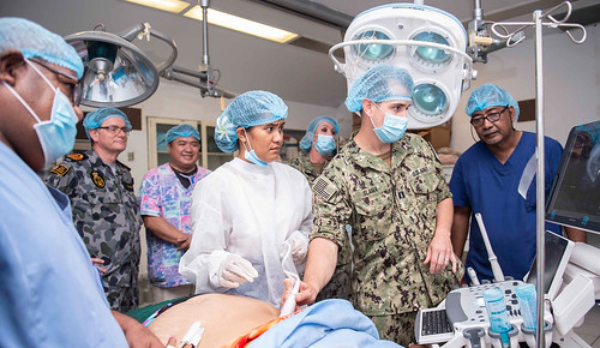The medical field is generally not the first career people think about when serving the military.
However, it is one of the smartest choices you can make both for your military and civilian career.
A Marine doctor is a qualified medical professional that receives most (or all) of his or her training thanks to Uncle Sam.
Therefore, you can become a Marine doctor and let the federal government take care of most of the training and education expenses.
Furthermore, once you complete your time in the Marine Corps (USMC), military physicians are in high demand in the civilian world.
Learn how to become a Marine Corps doctor including the requirements for entry to the training program.
Related Article – How To Become A Navy SEAL Medic
Table of Contents
What Does A Marine Corps Doctor Do?

A Marine doctor falls under the command of the United States Navy.
Consequently, Marine doctors technically fall under the U.S. Navy umbrella yet still serve predominantly in the USMC.
The United States Marine Corps relies on the Navy for its health care needs.
For this reason, physicians that wish to serve in the U.S. Marine Corps may practice in more than 30 specialties.
What is fantastic about the Navy / USMC medical program is that it offers several practice settings that are even rare in the civilian world.
For example, Navy doctors get to practice aerospace or undersea medicine while others focus as flight surgeons.
These are all high pressure situations yet will really allow you to stand out once it becomes time to move on from the U.S. Armed Forces.
Different Ways to Pursue a Medical Career
The Marine Corps / Navy medical program is extremely flexible in terms of when you wish to enlist.
For example, some recruits elect to join the Marine Corps while they are still taking college courses to become a physician.
Meanwhile, others enroll in the USMC as a resident or practicing physician that already has experience under their belt.
The advantages to enlisting early in the Marine Corps is that the military branch can cover most (if not all) of the educational expenses.
The U.S. Armed Forces is fond of financing educations for aspiring medical professionals through the GI Bill.
While becoming a Marine doctor is one of the most challenging pursuits in the military branch, it is well worth the endeavor.
It takes sacrifice and hard work yet there are very few careers that are as self-fulfilling and rewarding as the medical profession.
Related Article – 68 Series MOS: A List of Medical Field Jobs in the Army
USMC Doctor: Day-to-Day Duties
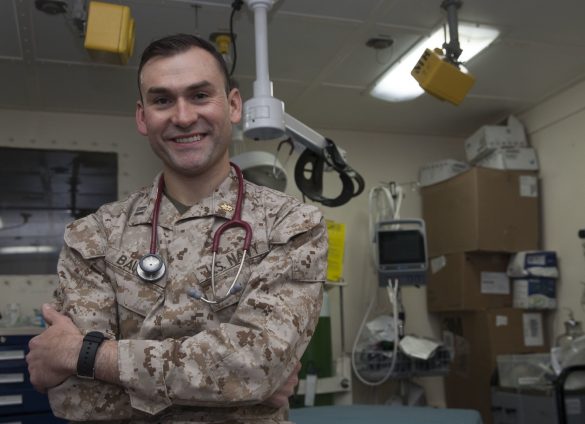
Marine Corps doctors serve under the umbrella of the United States Navy.
As a result, they are technically Navy physicians even if they primarily practice medicine in the USMC.
Marine / Navy physicians serve patients in very much the same way as the civilian world.
The U.S. Armed Forces can train you to become a medical professional with most of the expenses covered if you wish to join in that capacity.
A Marine doctor appreciates an accelerate career track where they can quickly ascend from education to training to real world experience.
Moreover, Marine doctors get to serve at some of the premier military medical facilities in the world.
Medical training in the military utilizes the latest technology and practices in medicine.
Furthermore, serving as a physician in the military enables you to assist in humanitarian and natural disaster relief efforts.
Nonetheless, the journey you wish to take is more in your hands than arguably any other profession in the military.
Some of the many highlights of becoming a Marine doctor include:
- Receiving hands-on experience from day one.
- Access to advanced training and technology (largely paid by military).
- Flexible schedule albeit long hours in stressful setting.
- Serving in some of the finest military medical institutions in the world.
- Manageable doctor to patient ratios for high quality, one-on-one care.
- Opportunity to earn terrific compensation and grow your career.
Becoming a physician in the military enables you to avoid many of the hassles of getting established first in the civilian world.
For example, Marine doctors do not need to worry about managing their own practice which includes complicated duties like handling a budget or making staff cuts.
Consequently, it’s a decent way to get into the business without having to find employment on your own after graduating from medical school.
Related Article – Military Medical Waiver Guide
Marine Doctor Requirements
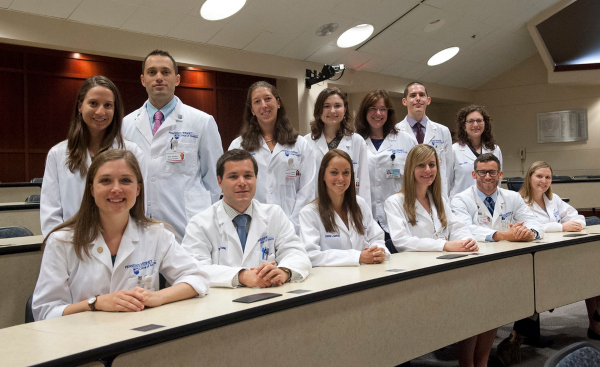
The qualifications needed to become a Marine doctor depend on the route you take to join the Marine Corps.
For starters, recruits have the ability to enlist in the USMC directly out of high school.
The first route makes it possible to enroll in college and complete medical school while you are still technically in the military.
The Navy Delayed Entry Program, Officer Candidate School (OCS), and Navy Reserve Officer Training Corps (NROTC) are 3 examples of how recruits train to become physicians while preparing for deployment.
On the other hand, doctors may enlist in the Marine Corps that already have experience in the civilian world.
Thus, there are several different routes to becoming a Marine doctor.
Basic Requirements
The basic requirements to serve in Navy Medical Corps include:
- Being a citizen of the United States.
- Between the ages of 21-64 (may be considered if 64+).
- Willing to serve a minimum of 2 years (active-duty).
- Graduate of an eligible medical school (AMA or AOA accreditation).
- Acceptable physical condition and pass full medical evaluation.
These general qualifications are only an outline as selection varies on many factors including whether you are currently serving, have served before, or never served.
Furthermore, the qualifications also vary based on whether the physician prefers to serve Active-Duty or Reserve-Duty.
Those that already have experience in the medical field must have completed at least 1-year of graduate-level medical education.
Lastly, medical professionals must have a current state medical license within 1 year of joining the Navy Medical Corps.
High School Students
Are you interested in becoming a Marine doctor after graduating high school?
First, meet with a high school counselor to discuss the requirements and obligations of Navy Medical Corps.
It is important that you complete any college preparatory courses that will help you excel in college.
Secondly, schedule a visit with a local Navy recruiter to discuss the responsibilities and expectations of the medical program.
You may also find it helpful to reach out to college admissions to discuss financing options if the military branch is unable to cover education expenses.
If you have the grades, some high school students apply for the U.S. Navy Academy in Annapolis for consideration of its highly regarded medical program.
It basically covers the entire cost of a medical education yet the Naval Academy is one of the hardest schools to get into in the country.
The second option is to consider joining the Navy Reserve Officer Training Corps (NROTC).
Navy ROTC provides scholarships for undergraduate studies as well as for additional military training.
It’s a fantastic program that can potentially cover 100% of your studies yet you need to realize that strings are attached to the commitment.
College students must pay back tuition and other expenses if they fail to graduate or complete a service agreement following graduation.
High school graduates that are interested in getting their education and training for free should consider the following:
- Navy Health Professions Scholarship Program: Covers tuition, monthly stipend, and $20,000 signing bonus.
- Navy Health Services Collegiate Program: Includes monthly military salary, housing allowance, and health care. The average recipient earns between $157,000 – $269,000 over 4 years.
These 2 program enable students to choose the medical school of their preference.
Related Article – Army Combat Medic Specialist (MOS 68W): Career Details
College Students – Undergraduate
It is not uncommon for college students to change their minds halfway through their education.
For this reason, it is never late to switch directions and serve in the United States Marine Corps.
If you are already enrolled in college, make sure that you are taking courses and ideally thriving in:
- Biology
- Physics
- Chemistry
- Calculus
- English
These undergraduate courses are generally required for most medical schools.
Therefore, excelling in these subjects will present you with stronger consideration for the top med schools in the country.
College admissions should have more qualify information about what it takes to get accepted into med school.
The U.S. Armed Forces accepts graduates from both civilian medical schools as well as the Uniformed Services University of the Health Sciences (USUHS) in Maryland.
Along with other commitments, make sure that you get the best possible score on the Medical College Admissions Test (MCAT).
Finally, undergraduates in NROTC must apply for the U.S. Navy in addition to medical school to maintain military obligations while in school.
Medical School Students
Graduates of medical school have several other options for how they wish to join the Marine Corps / Navy.
It is recommended that you speak with a Navy recruiter to discuss your enlistment options for the medical profession based on education and prior experience.
Additionally, the military may provide repayment loans for education that you already completed or support medical residency training in exchange of a service commitment.
Those that earn a bachelor’s degree with a 3.2 GPA or higher qualify for the Enlisted to Medical Degree Preparatory Program.
The training program is very resourceful as you take prep classes to prepare for the MCAT.
Residents in the U.S. Navy qualify for the Financial Assistance Program.
The program offers a grant of $45,000 per year along with a monthly stipend to assist with up to 4 years of a medical residency.
Moreover, physicians that are already licensed when joining the U.S. Navy or Marine Corps receive additional compensation along with sign-on bonuses.
The one-time sign-on bonus is significant and usually entices Marine doctors with experience thanks to an extra $220,000 – $400,000.
Furthermore, the Navy Health Professions Loan Repayment Program can provide up to $120,000 to pay back money you borrowed for med school.
Lastly, members of NROTC do not automatically qualify for med school through the U.S. Navy.
In the event that you fail to qualify for med school, the military branch will still assign you to another non-healthcare or non-physician position.
Related Article – Military Medical Separation & Retirement
Marine Doctor Training
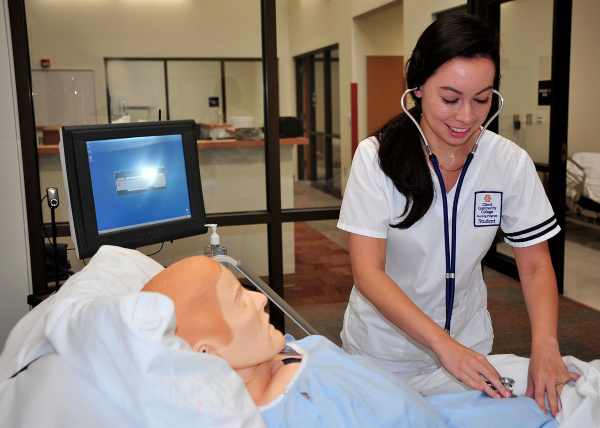
There is not a single, precise route to becoming a Marine doctor.
Instead, future physicians as well as current doctors have several different means to become a doctor in the U.S. military.
Becoming a Marine doctor is a smart investment in your future for a variety of reasons.
Here is the most traditional route to becoming a Marine doctor:
- Graduate from high school.
- Apply for college and complete your undergraduate degree.
- Consider joining the Navy Reserve Officer Training Corps (NROTC)
- Take the Medical College Admissions Test (MCAT).
- Apply for medical school (military financing available).
- Apply for the Navy Health Professions and Health Services college scholarships.
- Attend medical school and complete training for program.
- Graduate from med school and complete the service obligations of your military agreement.
While this is a long, challenging route to becoming a Marine doctor, it is worth the time and effort.
Officers in the Navy Medical Corps get to attend the medical school of their choice and generally graduate debt-free.
Furthermore, all the time and energy spent studying and training entitles new physicians to a $4000,000 sign-on bonus.
The benefits of Navy Medical Corps also includes a generous housing allowance and access to even more education or training opportunities.
Navy / Marine doctors have access to the most recent cutting-edge technology and training in the medical field.
Navy physicians are able to put the skills they attained to immediate use while they serve the country.
Marine Doctor Specialties
You can specialize in the following medical fields as part of the Navy Medical Corps*:
- Aerospace Medicine
- Anesthesiology
- Cardiology
- Dermatology
- Emergency Medicine
- Family Medicine
- Geriatrics
- Infectious Disease
- Neurology
- Nuclear Medicine
- Obstetrics / Gynecology
- Occupational Health
- Pain Management
- Pediatrics
- Physical Therapy
- Radiology
- Sports Medicine
- Undersea / Diving Medicine
Additionally, Marine doctors can prepare to become surgeons in the following fields:
- Cardiothoracic
- General Surgery
- Neurosurgery
- Orthopedics
- Transfusion Medicine
*NOTE: Admission to these specialties in the Navy Medical Corps is not guaranteed. Admission to medical school is highly competitive.
Related Article – Army Preventive Medicine Specialist (MOS 68S): Career Details
Civilian Career Opportunities
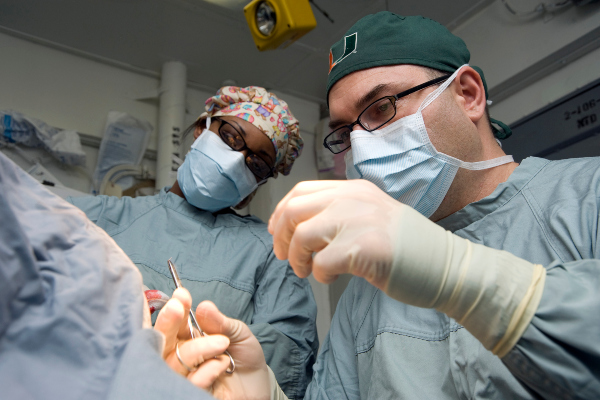
It is common for many physicians to get their start in a military branch.
The investment in your future is wise as you prepare for a rewarding yet challenging career.
It does take a lot of time and energy to become a Marine doctor yet is worth the extra trouble.
Most medical professionals in the military graduate from college debt-free which is difficult to do elsewhere.
Secondly, Navy / Marine doctors specialize in unique fields of medicine along with high pressure work environments.
You will not only get rewarded financially while serving in the U.S. Marine Corps but thereafter.
In fact, medical doctors in the military have one of the easiest transitions to the civilian world where their job skills remain in high demand.
Marine doctors often work at some of the most prestigious and herald military medical facilities in the world.
Consequently, they bring invaluable skills and life preparation to the operation table.
For this reason, you should not have a problem finding work after leaving the military, unlike some Navy ratings.
Related Article – Army Medical Logistics Specialist (MOS 68J): Career Details
Conclusion
First, most people desire to become physicians because it enables you to help save lives and improve the health of others.
While it is a long journey from high school graduation to the MCAT and completion of medical school – it is worth pursuing.
The Navy Medical Corps employs Marine doctors for the medical branch it also oversees.
As a result, you can get most (if not all) of your education and training paid for by the U.S. government if you elect to serve in the military thereafter.
It is a responsible and smart way to attain the job skills needed to serve in a very important (and financially rewarding) profession.
Even better, the job prospects are just as strong after your time in the military expires and you transition into civilian employment.
See Also
Does The National Guard Pay For College?
- 5 Best Jobs for Female Marines - June 20, 2024
- 10 Best Marine Corps Recruiting Videos of All Time - June 20, 2024
- Marine Corps Requirements - June 20, 2024

